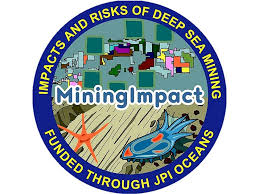Research and development
Recovery and Resilience Plan
- IPMA - PRR
- C5 - Investimento e Inovação
- C8 - Florestas
- C10 - Mar
- C16 - Empresas 4.0
- C19 - Administração Pública digital
- C21 - REPowerEU
Featured projects
Research Areas
Scientific Council
EEAGRANTS projects
MAR 2020
Grants
Fisheries and Sea - Project detail
MiningImpact 2
| Project Name | Environmental impacts and risks of deep-sea mining |  |
|---|---|---|
| Funding entity | JPI-Oceans, Fundação para a Ciência e Tecnologia | |
| Project leader | MatthiasHaeckel/GEOMAR | |
| Project manager | IPMA/Joana Raimundo, GEOMAR, MPI, SGN, UBielefeld, AWI, JUB, BGR, MARUM, UKiel, NIOZ, UUtrecht, TUDelft, UGent, RBINS, DNVGL, NIVA, UResearch, GRIDA, NTNU, (CESAM) UAveiro, CIIMAR, (CIMA) UAlgarve, IMAR, Ifremer, UniVPM, NHM, USou, ULodz, ISA, NHHSNF | |
| Description | MiningImpact 2 will extend its work towards three major research interests concerning deepseamining: (a) the larger scale environmental impact caused by the suspended sedimentplume, (b) the regional connectivity of species and the biodiversity of biological assemblagesand their resilience to impacts, and (c) the integrated effects on ecosystem functions, suchas the benthic foodweb and biogeochemical processes. In this context, key objectives of the project are: (1) to develop and test monitoring conceptsand strategies for deep-sea mining operations; (2) to develop standardization procedures formonitoring and definitions for indicators of a good environmental status; (3) to investigatepotential mitigation measures, such as spatial management plans of mining operations andmeans to facilitate ecosystem recovery; (4) to develop sound methodologies to assess theenvironmental risks and estimate benefits, costs and risks; and (5) to explore howuncertainties in the knowledge of impacts can be implemented into appropriate regulatoryframeworks. While the first project phase could investigate only experimental and/or rather small-scaledisturbances of the seafloor, in the second phase a comprehensive monitoring program willbe devoted to the industrial test of the prototype nodule collector system of the Belgiancontractor DEME-GSR. The equipment trial intends to harvest nodules from the seabed inareas that are approximately 300 x 300 m2 large, located in the Belgian and the Germancontract areas of the CCZ. Thus, MiningImpact 2 will collect independent scientificinformation on the environmental impacts of this operation. Here, the primary focus is onconstraining and quantifying the temporal dynamics and characteristics of the suspendedsediment plume, the spatial footprint of the deposited sediment blanket, and the inducedeffects on the abyssal ecosystem | |
| Start date | 2018-08-01 | |
| End date | 2021-07-31 | |
| Contact | 2021-07-31 | |
| External Links | ||

